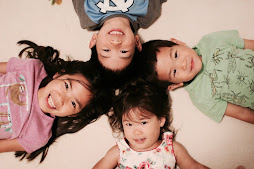Sunday, August 26, 2018
Tuesday, August 21, 2018
Lemons
I was holding Esme today in our back yard when I suddenly noticed a few lemons on our lemon tree. The house had a huge lemon tree that had to be razed down during renovation so we planted a new one, right next to the sunroom window, but I had never noticed any fruit. I turned and saw two green orbs hanging low off our young pomelo tree. Surprisingly, all the fruit trees were alive—apricot, guava, apple—not only alive, but looking pretty good. I still thought of them as the scrawny things we first planted, but they were sturdier now, with plenty of green leaves.
On the East Coast, the sprinkler systems are above-ground, spraying water in a big, rainbow-catching arc across the entire lawn. In the drought climate here, lawns are rare; our watering system like most is underground. A black tube runs around to each plant, seeping just the right amount of water into their roots invisibly every few days. You never see anything happening, but here are these plants, staying green, even growing, in the dry, brown landscape.
And of course I’m thinking, look at us. Look at me. Here we are, living in a place that a year ago seemed so wrenchingly far from home that it left a void that could never be filled. Some kind of seismic shift in self that I couldn’t quite name. At one point I resented it all, even the weather that made me feel like I was stuck in an annoyingly perfect time capsule.
Someone told me once, people here are like ducks. They look relaxed on the surface, like they’re gliding effortlessly where they want to go, but underneath they’re paddling furiously. Their kids are in the best schools in the country, but they’re constantly worried about whether they’re doing the right activities and being raised in line with the most recent studies. Their jobs are elite, but they feel inadequate, like imposters in a high-pressure culture. They live on land that cost millions of dollars, but bear the stress of remodeling or constantly fixing up the old houses sitting on them. They live within access to amazing venues for food and entertainment, but have to deal with constant traffic and insufficient parking to get there.
So I thought when I got here, I don’t want any of that. I want to be me, and I want to be it authentically. If I’m struggling, I want to share it. If I’m putting my kid in an activity, I’m going to be intentional and open about it. I don’t want scheduling every minute of our lives to be our default. I want to have an open door.
And I kept trying to catalogue what I felt was inevitable cultural assimilation. But my list boiled down to mostly material things (own joggers, addicted to boba, carries sunscreen). I couldn’t really capture the subterranean part of it. Sometimes, it felt like swimming against the current, heading upstream against all the other ducks paddling furiously the other way, which required a level of intentionality that was both lonely and draining. Other times, it felt like discovering something that made a part of me open up: stimulating conversations, a new kind of grandeur in nature, a kind of thriving I could see in Dave and the kids.
But today, I looked at the lemon tree and felt surprised. This is what it’s like. I really don’t feel like I’m paddling desperately under the surface. There is instead a kind of sustenance that is as sure as it is invisible. Somewhere along the way, I stopped resenting the differences here. It became just like following the same God I had always followed, who knows and loves me the same way on any coast. And who still provides what I need to draw from each day. I hardly even saw it until Esme dragged me outside to show me a purported black lizard she had spotted and we found lemons instead.
Subscribe to:
Posts (Atom)













